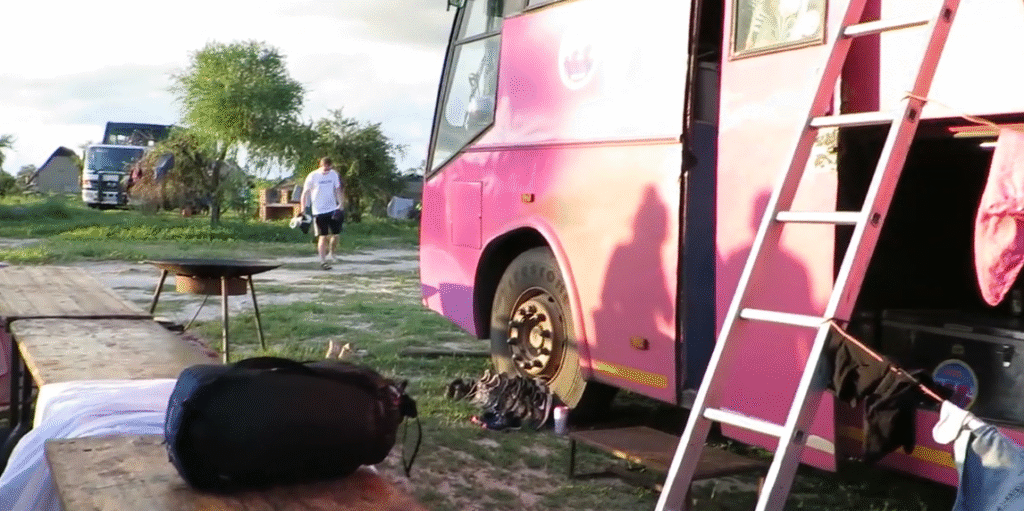Anders Eriksson’s life has never been typical. His story unfolds like a hand-drawn map, imperfect, convoluted, and bursting with vibrant color, rather than in tidy chapters. He is 82 years old and the tireless driving force behind Sweden’s most iconic travel movement, Rosa Bussarna. His path has been shaped less by business reasoning and more by instinct, risk, and an almost childlike curiosity about how far one can go—both geographically and personally—from the pink-painted buses to the rough, community-minded vibe of his tours.
At the age of 26, Anders and a group of friends purchased a used bus in 1969 with the ambitious goal of traveling to India by land. Before the trip started, the majority of his friends left, but he persisted with just one friend and a load of wooden clogs that they intended to sell along the way. They picked up hitchhikers who paid to join them as they wandered through far-off towns. What began as a road trip swiftly evolved into an improvised business plan, which turned out to be surprisingly effective. They were richer than they had been when they returned to Sweden.
Rosa Bussarna was founded on that unplanned success. Eriksson was the leader of the first official group to depart in 1972. The buses, which were painted bright pink and equipped for both travel and overnight stays, became popular very fast. India was the primary destination in the beginning, but as the business grew, routes were added to Africa, South America, Southeast Asia, and other regions. He created experiences rather than just itineraries, emphasizing group adventure over individual luxury and pushing boundaries.
Anders Eriksson: Bio and Career Highlights
| Name | Anders Eriksson |
|---|---|
| Age | 82 (as of 2025) |
| Residence | Stockholm, Sweden |
| Occupation | CEO, Travel Entrepreneur, Adventurer |
| Company | Rosa Bussarna / Anders Eriksson Travel AB |
| Founded | 1972 |
| Notable Ventures | Group travel to India, Africa, South America, Asia |
| Known For | Founder of Rosa Bussarna, host of 2025’s Sommar i P1 |
| Book | Rosa Bussarna och han som aldrig slutade leka (2022) |
| Personal Life | Adopted two daughters from China |
| Website | www.rosabussarna.com |

In contrast to traditional tour companies, Rosa Bussarna established a solid reputation for handling discomfort well. In addition to bunking in buses and sharing chores, passengers also adjust to unexpected detours. However, the discomfort frequently leads to connection. Eriksson developed a travel format that is incredibly successful at fostering a sense of community among strangers by utilizing group dynamics and shared storytelling.
There are many scenes in his life that seem made up but are actually real. In the midst of political turmoil in Iran, one of his buses was shot at. As the glass shattered, passengers lay on the floor, protecting themselves with mattresses. In another episode, he was hanging by his arms over a Central African river that was teeming with leeches and crocodiles. He was once stuck in a small tunnel in Kashmir. He quickly brushes off the drama, though. These encounters are merely a part of the journey for him.
Eriksson’s approach to logistics isn’t the only thing that makes him particularly inventive. It’s the way he thinks. He began a recent Sommar i P1 broadcast with a statement that still sums up his philosophy: “You don’t stop playing because you grow old.” You stop playing as you get older. It’s a strategy, not a catchphrase. He has centered an entire business on that idea, demonstrating that happiness, adventure, and risk-taking are not only timeless but also vital.
Like his travel design, his storytelling has a natural yet well-crafted feel. He told stories about traders, broken engines, lost passports, and impromptu friendships in his radio segment. However, the tone softened when he talked about his adopted daughters. With such earnestness that it halted the flow of his monologue, he referred to them as his two greatest loves. This emotional core—his boundless love for people and places—is what sustains the Rosa Bussarna ethos despite all the mishaps.
Decades after his career began, Eriksson is still actively mapping new routes and addressing groups of inquisitive tourists. He has never grown cynical. Rather, he appears to be energized by every group of strangers who agree to eat rice on folding tables and sleep in a moving bus. The business continues to provide trips to both well-known and lesser-known locations thanks to strategic alliances and a reliable staff. Every itinerary echoes his signature: unvarnished, immersive, and raw, whether it’s the Trans-Siberian Railway or South American music festivals.
Since 1972, the travel industry has undergone significant change. Over-glorification of luxury has made carefully planned experiences seem too good to be true. Eriksson’s model, however, has persisted. It’s remarkably similar to a theater group, where everyone plays a part and the final result is determined by everyone’s combined efforts. Rosa Bussarna prospers because it encourages others to share in risk rather than avoiding it. Artists, journalists, students, and retirees have all been drawn to this idea.
Rosa Bussarna och han som aldrig slutade leka, his book, encapsulates the essence of those years through heartfelt, humorous, and tense moments rather than ostentatious photographs. Due to its popularity, both new readers and previous travelers now have a different perspective on what travel can be.
In a time when eco-friendly travel and minimalist architecture are popular, Rosa Bussarna’s straightforward design is surprisingly reasonably priced and ecologically friendly. Instead of promoting carbon-intensive resorts, it promotes shared rides, slower travel, and thoughtful interaction with locals. Eriksson’s legacy provides something incredibly dependable by fusing adventure with purpose: the assurance that travel has the power to transform us even today.
By 2025, Rosa Bussarna is still expanding and drawing in new generations of adventurers who value impact over luxury. It’s definitely unpredictable and not always comfortable. However, in an era of automation, its profoundly human qualities are becoming more and more scarce.

